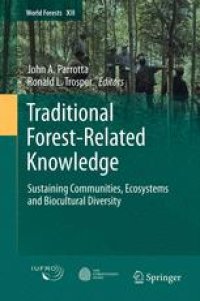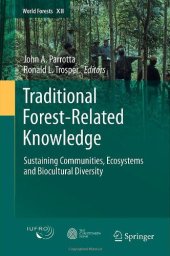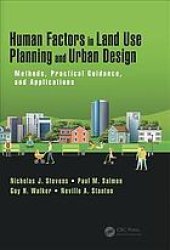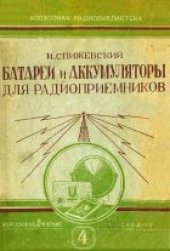
Ebook: Traditional Forest-Related Knowledge: Sustaining Communities, Ecosystems and Biocultural Diversity
- Tags: Ecology, Environment general, Social Sciences general, Forestry, Nature Conservation, Philosophy of Nature
- Series: World Forests 12
- Year: 2012
- Publisher: Springer Netherlands
- Edition: 1
- Language: English
- pdf
Exploring a topic of vital and ongoing importance, Traditional Forest Knowledge examines the history, current status and trends in the development and application of traditional forest knowledge by local and indigenous communities worldwide. It considers the interplay between traditional beliefs and practices and formal forest science and interrogates the often uneasy relationship between these different knowledge systems.
The contents also highlight efforts to conserve and promote traditional forest management practices that balance the environmental, economic and social objectives of forest management. It places these efforts in the context of recent trends towards the devolution of forest management authority in many parts of the world.
The book includes regional chapters covering North America, South America, Africa, Europe, Asia and the Australia-Pacific region. As well as relating the general factors mentioned above to these specific areas, these chapters cover issues of special regional significance, such as the importance of traditional knowledge and practices for food security, economic development and cultural identity. Other chapters examine topics ranging from key policy issues to the significant programs of regional and international organisations, and from research ethics and best practices for scientific study of traditional knowledge to the adaptation of traditional forest knowledge to climate change and globalisation.
Exploring a topic of vital and ongoing importance, Traditional Forest Knowledge examines the history, current status and trends in the development and application of traditional forest knowledge by local and indigenous communities worldwide. It considers the interplay between traditional beliefs and practices and formal forest science and interrogates the often uneasy relationship between these different knowledge systems.
The contents also highlight efforts to conserve and promote traditional forest management practices that balance the environmental, economic and social objectives of forest management. It places these efforts in the context of recent trends towards the devolution of forest management authority in many parts of the world.
The book includes regional chapters covering North America, South America, Africa, Europe, Asia and the Australia-Pacific region. As well as relating the general factors mentioned above to these specific areas, these chapters cover issues of special regional significance, such as the importance of traditional knowledge and practices for food security, economic development and cultural identity. Other chapters examine topics ranging from key policy issues to the significant programs of regional and international organisations, and from research ethics and best practices for scientific study of traditional knowledge to the adaptation of traditional forest knowledge to climate change and globalisation.
"Forestry, the oldest of the resource management sciences, has been coming under pressure in recent years to incorporate multiple values. Traditional Forest-Related Knowledge is remarkable for its comprehensive coverage of world regions and 'hot' topics such as globalization, climate change and research ethics. It is a unique book, marking a breakthrough with its authoritative treatment of alternative sources of knowledge and multiple perspectives, and contributing to a paradigm change in forest management."
- Fikret Berkes, Distinguished Professor and Canada Research Chair at the University of Manitoba, and author of Sacred Ecology
Exploring a topic of vital and ongoing importance, Traditional Forest Knowledge examines the history, current status and trends in the development and application of traditional forest knowledge by local and indigenous communities worldwide. It considers the interplay between traditional beliefs and practices and formal forest science and interrogates the often uneasy relationship between these different knowledge systems.
The contents also highlight efforts to conserve and promote traditional forest management practices that balance the environmental, economic and social objectives of forest management. It places these efforts in the context of recent trends towards the devolution of forest management authority in many parts of the world.
The book includes regional chapters covering North America, South America, Africa, Europe, Asia and the Australia-Pacific region. As well as relating the general factors mentioned above to these specific areas, these chapters cover issues of special regional significance, such as the importance of traditional knowledge and practices for food security, economic development and cultural identity. Other chapters examine topics ranging from key policy issues to the significant programs of regional and international organisations, and from research ethics and best practices for scientific study of traditional knowledge to the adaptation of traditional forest knowledge to climate change and globalisation.
"Forestry, the oldest of the resource management sciences, has been coming under pressure in recent years to incorporate multiple values. Traditional Forest-Related Knowledge is remarkable for its comprehensive coverage of world regions and 'hot' topics such as globalization, climate change and research ethics. It is a unique book, marking a breakthrough with its authoritative treatment of alternative sources of knowledge and multiple perspectives, and contributing to a paradigm change in forest management."
- Fikret Berkes, Distinguished Professor and Canada Research Chair at the University of Manitoba, and author of Sacred Ecology
Content:
Front Matter....Pages i-xxvi
Introduction: The Growing Importance of Traditional Forest-Related Knowledge....Pages 1-36
Africa....Pages 37-78
Latin America—Argentina, Bolivia, and Chile....Pages 79-117
Amazonia....Pages 119-155
North America....Pages 157-201
Europe....Pages 203-249
Russia, Ukraine, the Caucasus, and Central Asia....Pages 251-279
Northeast Asia....Pages 281-313
South Asia....Pages 315-356
Southeast Asia....Pages 357-394
Western Pacific....Pages 395-447
Globalization, Local Communities, and Traditional Forest-Related Knowledge....Pages 449-490
Traditional Forest-Related Knowledge and Climate Change....Pages 491-533
Ethics and Research Methodologies for the Study of Traditional Forest-Related Knowledge....Pages 535-562
The Unique Character of Traditional Forest-Related Knowledge: Threats and Challenges Ahead....Pages 563-588
Back Matter....Pages 589-621
Exploring a topic of vital and ongoing importance, Traditional Forest Knowledge examines the history, current status and trends in the development and application of traditional forest knowledge by local and indigenous communities worldwide. It considers the interplay between traditional beliefs and practices and formal forest science and interrogates the often uneasy relationship between these different knowledge systems.
The contents also highlight efforts to conserve and promote traditional forest management practices that balance the environmental, economic and social objectives of forest management. It places these efforts in the context of recent trends towards the devolution of forest management authority in many parts of the world.
The book includes regional chapters covering North America, South America, Africa, Europe, Asia and the Australia-Pacific region. As well as relating the general factors mentioned above to these specific areas, these chapters cover issues of special regional significance, such as the importance of traditional knowledge and practices for food security, economic development and cultural identity. Other chapters examine topics ranging from key policy issues to the significant programs of regional and international organisations, and from research ethics and best practices for scientific study of traditional knowledge to the adaptation of traditional forest knowledge to climate change and globalisation.
"Forestry, the oldest of the resource management sciences, has been coming under pressure in recent years to incorporate multiple values. Traditional Forest-Related Knowledge is remarkable for its comprehensive coverage of world regions and 'hot' topics such as globalization, climate change and research ethics. It is a unique book, marking a breakthrough with its authoritative treatment of alternative sources of knowledge and multiple perspectives, and contributing to a paradigm change in forest management."
- Fikret Berkes, Distinguished Professor and Canada Research Chair at the University of Manitoba, and author of Sacred Ecology
Content:
Front Matter....Pages i-xxvi
Introduction: The Growing Importance of Traditional Forest-Related Knowledge....Pages 1-36
Africa....Pages 37-78
Latin America—Argentina, Bolivia, and Chile....Pages 79-117
Amazonia....Pages 119-155
North America....Pages 157-201
Europe....Pages 203-249
Russia, Ukraine, the Caucasus, and Central Asia....Pages 251-279
Northeast Asia....Pages 281-313
South Asia....Pages 315-356
Southeast Asia....Pages 357-394
Western Pacific....Pages 395-447
Globalization, Local Communities, and Traditional Forest-Related Knowledge....Pages 449-490
Traditional Forest-Related Knowledge and Climate Change....Pages 491-533
Ethics and Research Methodologies for the Study of Traditional Forest-Related Knowledge....Pages 535-562
The Unique Character of Traditional Forest-Related Knowledge: Threats and Challenges Ahead....Pages 563-588
Back Matter....Pages 589-621
....


















